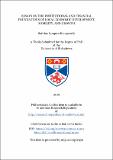Essays on the institutional and financial foundations of local economic development, mobility, and growth
Abstract
This thesis consists of three independent chapters. Chapter 1 describes briefly several
schools of thoughts and recent interest regarding economic development. Moreover, it explains
the role of historical shocks on economic development and provides an outline of this thesis.
The second chapter examines whether there is any long-term effect arising from ancient
colonialism on current economic development along the Mediterranean Sea at the local level.
More specifically, it is argued that ancient Greek, Phoenician, or Etruscan colonies that were
established after the 8
century BC, left their institutional, technological, and cultural legacy
perennially. Therefore, in places where there is at least one ancient colony from the abovementioned
civilizations,
there
is
higher
development
at
the
beginning
of
the
21st
century.
The
main
variables
consist
of
the
coordinates
of
ancient
colonies
as
well
as
light
density
at
night
from
the
space
as
an
index
of
development
at
the
local
level.
The
findings
suggest
that,
indeed,
in
places
that
we
observe
at
least
one
Greek,
Phoenician
and/or
Etruscan
ancient
colony
there
is
higher recent economic development. Several robustness checks validate the initial
hypothesis. In the third chapter, it is assumed that the Australian localities which were
colonised earlier by Europeans after 1788, experienced higher economic development
nowadays. Due to the limitation of technology, the size of Australia and the dissimilar
relationships between Europeans and Aboriginals along the Australian coasts, cities were
established almost in a random way and time. It is suggested that cities follow a dynamic
process of development based on several forces such as technology adoption, institutional
development etc. Thus, time is a significant parameter in explaining the development of urban
cities. Chapter 4 examines the role of financial environment on intergenerational mobility. In
1994, the United States adopted a reform which permitted the interstate banking. As a
consequence, banking competition at the local level increased and impacted on the real
economy via changes in household incomes, entrepreneurship, innovation and state-level GDP.
While prior literature has provided insights as to the interconnections between these banking
reforms and banking, household, firm and macroeconomic outcomes, to date there is no
evidence regarding the implications of banking sector deregulation for the economic mobility
of individuals. In Chapter 4, the results of an extensive empirical analysis suggest that banking
reforms affected the local financial environment and influenced the rates of intergenerational
mobility for children.
Type
Thesis, PhD Doctor of Philosophy
Collections
Items in the St Andrews Research Repository are protected by copyright, with all rights reserved, unless otherwise indicated.

